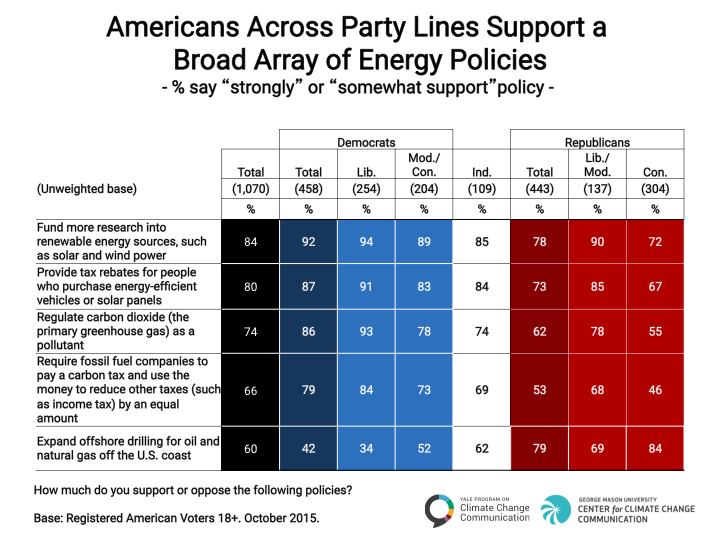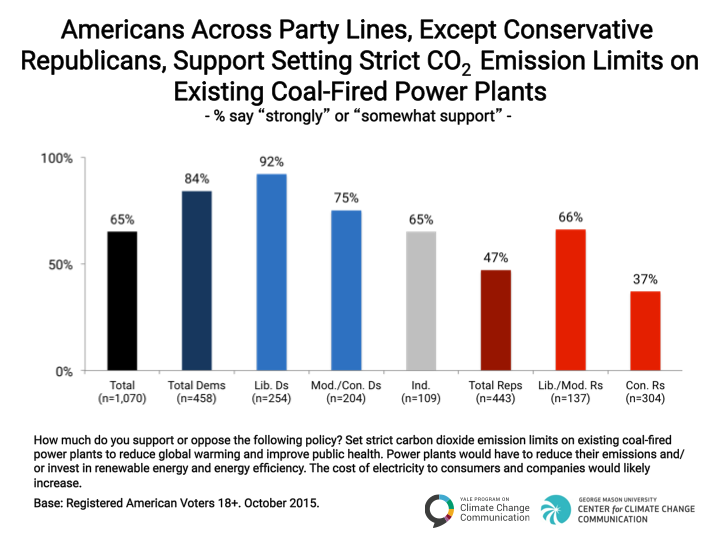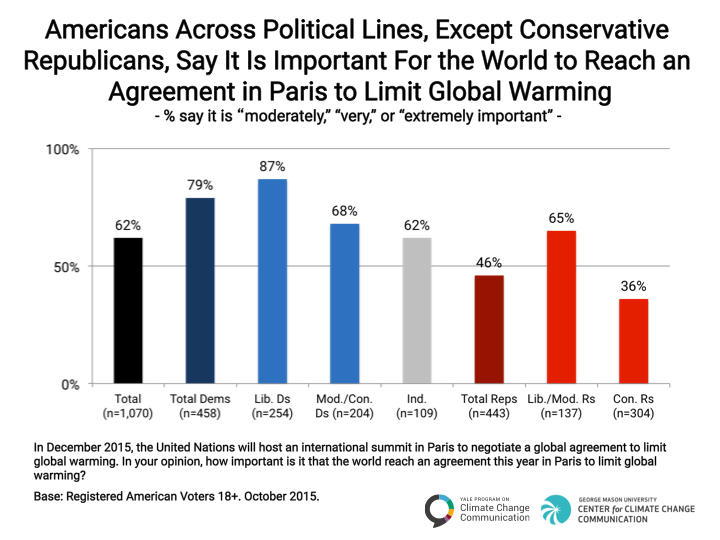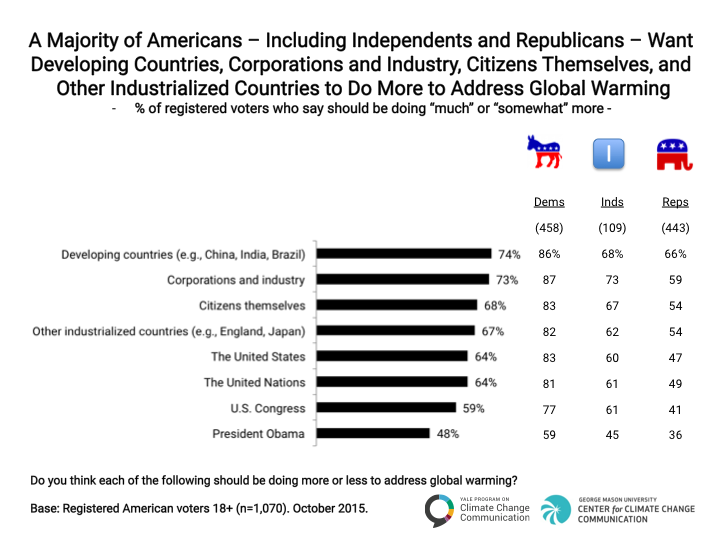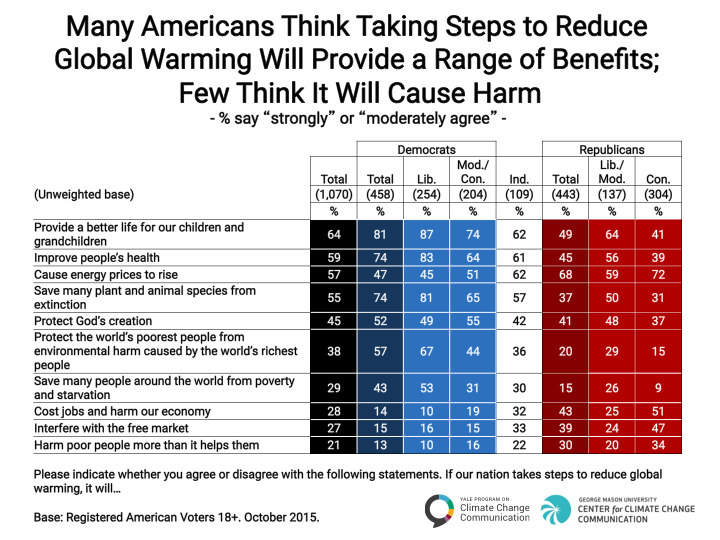Report · Dec 14, 2015
Politics & Global Warming, Fall 2015
By Anthony Leiserowitz, Edward Maibach, Connie Roser-Renouf, Geoff Feinberg and Seth Rosenthal
Filed under: Policy & Politics
4. Support for Global Warming Policies and an International Agreement
4.1. Americans across party lines support a broad array of energy policies.
Americans support a broad array of energy policies, including many designed to reduce carbon pollution and dependence on fossil fuels, and to promote clean energy technologies. Democrats are the most likely to support such policies, but majorities of Independents and Republicans do as well, including:
- Funding more research into renewable energy sources such as solar and wind power (84% of all Americans registered to vote, 92% of Democrats, 85% of Independents, and 78% of Republicans).
- Providing tax rebates to people who purchase energy-efficient vehicles or solar panels (80% of all Americans registered to vote, 87% of Democrats, 84% of Independents, and 73% of Republicans).
- Regulating carbon dioxide as a pollutant (74% of all Americans registered to vote, 86% of Democrats, 74% of Independents, and 62% of Republicans).
- Requiring fossil fuel companies to pay a carbon tax and using the money to reduce other taxes such as income taxes by an equal amount (66% of all American registered to vote, 79% of Democrats, 69% of Independents, and 53% of Republicans).
Conversely, fewer than half of Democrats support the expansion of offshore drilling for oil and natural gas off the U.S. coast (42%), while most Americans registered to vote (60%), including Independents (62%) and Republicans (79%), support it.
4.2. Americans across party lines, except conservative Republicans, support setting strict carbon dioxide emission limits on existing coal-fired power plants.
Two in three Americans (65%) support setting strict carbon dioxide emission limits on existing coal-fired power plants to reduce global warming and improve public health, even with the explicit caveat that the cost of electricity to consumers and companies would likely increase.
Most likely to support the limits are Democrats (84%, 92% of liberal Democrats), as well as liberal and moderate Republicans (66%), and Independents (65%, up 17 points since Spring 2014). However, only 37% of conservative Republicans would support setting strict limits on carbon dioxide emissions (up 6 points).
4.3. Americans across political lines, except conservative Republicans, say it is important for the world to reach an agreement in Paris to limit global warming.
The 21st United Nations Climate Change Conference (often referred to as COP21) recently concluded in Paris, leading to an international agreement to reduce global warming pollution. Prior to the start of the conference, six in ten Americans (62%) said that it was at least moderately important that the world reach an agreement in Paris to limit global warming.
This opinion was most widely held by liberal Democrats – nearly 9 in 10 (87%) said it was important to reach a climate agreement in Paris. At least six in ten moderate/conservative Democrats (68%), Independents (62%), and liberal/moderate Republicans (65%) also thought it was important to reach an agreement. By contrast, only about one in three conservative Republicans (36%) thought reaching an agreement on global warming in Paris was important.
4.4. A majority of Americans, including Independents and Republicans, want developing countries, corporations and industry, citizens themselves, and other industrialized countries to do more to address global warming.
Across party lines, over half of Americans think diverse actors should do much or somewhat more to address global warming:
- Developing countries, such as China, India, and Brazil (74% of registered American voters; 86% of Democrats, 68% of Independents, and 66% of Republicans)
- Corporations and industry (73%, 87%, 73%, and 59%, respectively)
- Citizens themselves (68%, 83%, 67%, and 54%, respectively)
- Other industrialized countries such as England, Germany, and Japan (67%, 82%, 62%, and 54%, respectively)
Over half of Americans, including Democrats and Independents, but not Republicans, think the following should do more:
- The United States (64% of registered American voters, 83% of Democrats, 60% of Independents, and 47% of Republicans)
- The United Nations (64%, 81%, 61%, and 49%, respectively)
- The U.S. Congress (59%, 77%, 61%, and 41%, respectively)
Over half of Democrats think President Obama should do more (59%).
4.5. Many Americans think taking steps to reduce global warming will provide a range of benefits. Few think it will cause harm.
Half or more of registered American voters think that if the United States takes steps to reduce global warming, it will provide a better life for our children and grandchildren (64%), improve people’s health (59%), and save many plant and animal species from extinction (55%).
Most Democrats, particularly liberal Democrats, expect these and other benefits, and half or more of Independents and liberal/moderate Republicans share these views. Fewer than half of conservative Republicans expect any of these benefits if the U.S. takes steps to reduce global warming.
Over half of Americans think that if the United States takes steps to reduce global warming, it will cause energy prices to rise (57%). But fewer than one third think it would cost jobs and harm our economy (28%), interfere with the free market (27%), or harm poor people more than it will help them (21%). Republicans, particularly conservative Republicans, and Independents are the most likely to expect these consequences.
